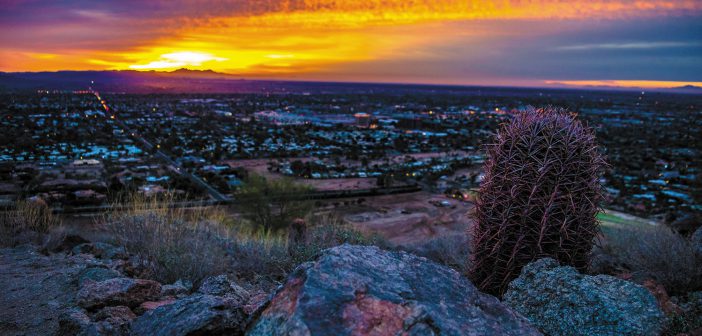by Asif Lakhani
When thinking about major cities in the U.S., Phoenix isn’t likely one that comes to mind. As of the 2017 Census, however, Arizona’s capital city is actually the fifth largest by population in the entire country. Phoenix’s land area is also among the top five of U.S. cities, and it has hosted its fair share of major events to solidify its reputation.
Phoenix has hosted multiple college football playoff games and Super Bowls, with both events scheduled to return to the city in late 2019 and early 2023, respectively. Phoenix also will host the NCAA Men’s Final Four in 2024. On a smaller scale, the Greater Phoenix region hosts MLB’s Cactus League (spring training) annually for more than a dozen teams. Cactus League games drew a record-high 1.9 million visitors in 2017. The 2018 season had an economic impact of $644 million, according to a study by Arizona State University.
TOURISM SURGE BOOTS MARKET, DEVELOPMENT
While Phoenix has always been considered a resort destination, the city is currently in the midst of a renaissance as an urban destination as well, Eric Kerr, the director of Research and Business Analysis for Visit Phoenix says. The Greater Phoenix area hosted 44 million visitors in 2017 who accounted for more than $7 billion (estimated) in direct spending, according to a report from Visit Phoenix. Travel and tourism expenditures supported more than 128,000 jobs in Phoenix in 2017, the report says. The city experienced an increase in occupancy rates and room nights sold in 2018 and, as of May 2019, is on pace to beat those numbers.
The Phoenix market is responding positively to the high demand. Nearly 50 properties have undergone or are currently experiencing more than $650 million in renovations since 2015. In total, Phoenix has approximately 160 hotels and resorts with more than 27,000 rooms, and there are more on the way. Two major hotel openings for this year include a 350-room Great Wolf Lodge in September and a 264-room Marriott in late 2019, which will be the brand’s largest full-service hotel in Arizona.
HOME SHARING VS. HOSPITALITY
An interesting thing to note about Phoenix is its stance on home-sharing platforms such as Airbnb and VRBO. Arizona has taken a more welcoming approach to such platforms.
In 2016, Arizona Gov. Doug Ducey signed a bill that prohibited local governments from keeping home-sharing platforms out of their communities. Then, in May 2019, Gov. Ducey signed HB 2672, which added regulations to the local home-sharing economy. Notable changes include the need for a main contact to be listed should an excessive noise (or other) complaint be filed. The bill also requires renters to obtain a tax license before listing their properties, and it prohibits rental properties from being used for events that would require a permit or license. Lastly, the bill also prevents rented properties from being used as retail spaces, restaurants, or banquet halls.
PHOENIX RISING
Ultimately, it’s only a matter of time before Phoenix is regularly included in the conversation of premier destinations in the United States. Its grid-layout gives it a true city feel. Coupled with a large population and traditional downtown, it breeds an urban oasis atmosphere.
What’s arguably even more impressive about Phoenix is the number of natural parks within close proximity. Camelback Mountain and Saguaro Lake are two gems adored by visitors and travelers alike, and Grand Canyon National Park is just under four hours away.
If the future is as bright as the sun shines in Phoenix, then now is a good time to begin planning a business venture in the Valley of the Sun.



